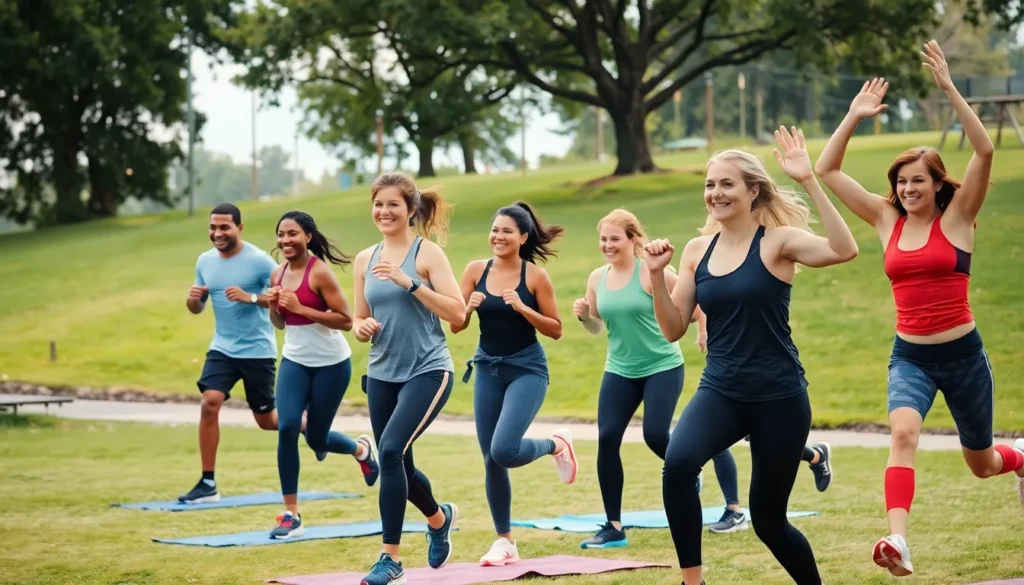In a world where gym memberships often go unused and workout plans gather dust, progressive fitness challenges are shaking things up. Imagine transforming your routine from mundane to exhilarating, all while inching closer to your goals. These challenges aren’t just about sweating it out; they’re about leveling up in a fun and engaging way.
Table of Contents
ToggleUnderstanding Progressive Fitness Challenges
Progressive fitness challenges provide a structured approach to improving physical fitness over time. They serve as an engaging tool that encourages participation and motivates individuals to achieve their fitness goals.
Definition and Purpose
Progressive fitness challenges involve gradually increasing the intensity or duration of physical activities to facilitate continuous improvement. The primary aim includes promoting consistent exercise habits while enhancing overall fitness levels. Participants experience a sense of achievement as they progress through various stages, making fitness both enjoyable and rewarding. This method addresses common barriers like boredom and lack of motivation, transforming exercise into a fun, goal-oriented experience.
Key Principles
Several key principles govern progressive fitness challenges. First, gradual progression is essential; this prevents injury and encourages sustainable advancement. Next, variety plays a critical role; incorporating diverse activities keeps participants engaged and excited. Personalized goals enhance motivation, with each individual setting specific targets based on their fitness levels. Additionally, community support cultivates camaraderie among participants, fostering a sense of accountability. This combination of factors leads to improved adherence to fitness routines and greater overall success in reaching health objectives.
Benefits of Progressive Fitness Challenges

Progressive fitness challenges lead to significant health improvements, enhancing both physical and mental well-being.
Physical Health Improvements
Increased physical fitness is a major benefit of participating in progressive fitness challenges. Participants build strength by gradually intensifying workouts. Improved cardiovascular health occurs as individuals engage in higher levels of aerobic activities. Enhanced flexibility results from a diverse range of exercises incorporated into challenges. Weight management becomes more attainable as regular exercise routines help maintain a healthy body weight. Reduced risk of chronic conditions like heart disease and diabetes is often noted among participants. Structured goals make it easier to track progress, ultimately fostering a consistent fitness routine.
Mental Health Benefits
Mental health sees notable enhancements through progressive fitness challenges. Endorphin release during workouts boosts mood and decreases feelings of anxiety. Participants often experience increased motivation, helping them push through barriers. Social interaction in group challenges strengthens connections, reducing feelings of isolation. Additionally, goal achievement fosters a sense of accomplishment, enhancing self-esteem. Improved focus and concentration can result from regular physical activity, benefiting daily tasks. Overall, the combination of these factors contributes significantly to improved mental well-being.
Types of Progressive Fitness Challenges
Progressive fitness challenges come in various forms. Each type targets specific aspects of fitness, allowing participants to choose challenges that suit their goals.
Strength-Based Challenges
Strength-based challenges focus on building muscle and increasing strength. Participants engage in weightlifting routines, bodyweight exercises, or resistance training. These challenges often involve gradual increases in weight or repetitions over time. For example, a participant might start with lighter weights, adding increments weekly to enhance strength effectively. Additionally, structured programs like the StrongLifts 5×5 or the 30-Day Push-Up Challenge offer clear guidance for progress. The goal centers around mastering techniques and ensuring safety while pushing physical limits.
Endurance-Based Challenges
Endurance-based challenges enhance cardiovascular fitness and stamina. Activities may include running, cycling, swimming, or aerobic workouts. Participants typically increase the duration or intensity of exercises incrementally. For instance, a running challenge might start with a 5K and progress to a half-marathon over several months. Programs like the Couch to 5K provide structured plans for beginners aiming for longer distances. Successfully completing these challenges enhances endurance and promotes better heart health and overall fitness.
Flexibility and Mobility Challenges
Flexibility and mobility challenges prioritize range of motion and body movement. These challenges often incorporate practices like yoga or dynamic stretching. Participants may follow routines that gradually increase flexibility, such as the 30-Day Yoga Challenge. Improved mobility contributes to injury prevention and better overall functionality in daily activities. Additionally, incorporating stretch routines regularly supports recovery and enhances performance in strength and endurance training. Participants often experience increased energy levels and reduced muscle tension as they progress.
How to Create a Progressive Fitness Challenge
Creating a successful progressive fitness challenge involves careful planning and thoughtful execution. Structured steps lead to measurable progress and long-lasting engagement.
Setting Realistic Goals
Setting achievable goals is essential for any fitness journey. Clear, specific targets motivate participants while keeping them focused. Using metrics like weight loss or distance run helps define these goals. Consider breaking larger objectives into smaller, manageable milestones. Celebrating these minor achievements fosters motivation and encourages ongoing commitment. Participants maintain engagement by setting timelines for each target. Goals can adapt over time, accommodating progress and enhancing overall satisfaction with the challenge.
Monitoring Progress
Monitoring progress plays a critical role in a progressive fitness challenge. Regular check-ins help participants understand their improvements and identify areas for growth. Tracking workout data, such as repetitions performed or distances covered, provides tangible evidence of advancement. Monthly assessments or fitness journals support this tracking process. Participants can adjust their routines based on the insights gained from monitoring progress. Incorporating technology like fitness apps helps streamline this effort. Making progress visible boosts morale and encourages a continued commitment to fitness goals.
Progressive fitness challenges offer an engaging way to transform exercise into a rewarding journey. By incorporating gradual progression and community support, individuals can enhance their physical and mental well-being while achieving their fitness goals.
These challenges make workouts exciting and sustainable, helping participants stay committed to their health journeys. With the right planning and personalized goals, anyone can experience the benefits of improved strength, endurance, and flexibility. Embracing progressive fitness challenges not only fosters a sense of accomplishment but also promotes a healthier lifestyle in a fun and motivating environment.








